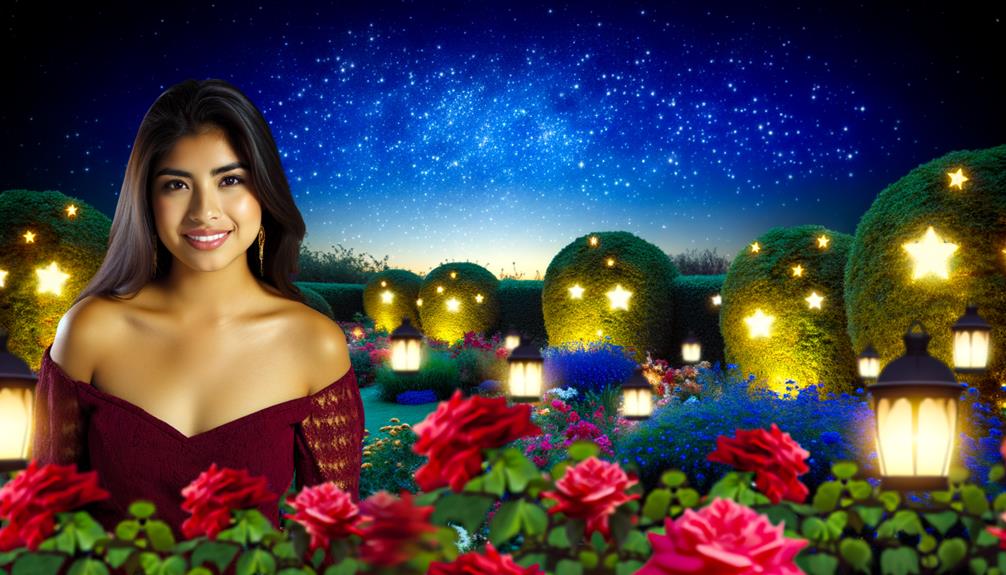Meaning of the Name Roxanne
The name Roxanne, derived from the ancient Persian name 'Roxana,' means 'bright' or 'dawn'. Historically, it signifies light and radiance, intrinsic to its etymology in Old Persian 'Raoxshna'.
Roxanne, the wife of Alexander the Great, embodies elegance, hope, and new beginnings. The name permeates literature, music, and film, symbolizing strength and beauty.
Its cultural variations like Roxy and Roxie reflect its enduring appeal and versatility. Modern representations continue to highlight its significance in illuminating hope and renewal.
Those intrigued by its rich layers can explore deeper insights into its historical origins, cultural significance, and notable namesakes.

Key Takeaways
- Roxanne means 'bright' or 'dawn' and originates from ancient Persian.
- Symbolizes light, radiance, and new beginnings.
- Derived from the Old Persian name 'Raoxshna'.
- Cultural associations emphasize elegance, hope, and renewal.
- Popular in literature, music, and film, reflecting strength and beauty.
Historical Origins
The name Roxanne has its roots in ancient Persian history, deriving from the name 'Roxana,' which means 'bright' or 'dawn.' Historically, Roxana was a figure of significant importance, being the wife of Alexander the Great.
Her name, with its etymological origins in Old Persian 'Raoxshna,' symbolizes light and radiance. This designation was indicative of her esteemed status and the high regard in which she was held.
The name evolved through various cultures and languages, including Greek and Latin, eventually transforming into the modern form, Roxanne. The historical journey of this name highlights its enduring nature and the cultural exchanges that have preserved its essence over centuries, reflecting the interconnectedness of ancient civilizations.
Cultural Significance
Roxanne carries a rich cultural significance, symbolizing light and radiance across various societies and epochs. Its etymological roots in the Persian 'Roxana,' meaning 'dawn' or 'bright,' have bestowed it with a universal sense of luminosity and hope.
The name has permeated literature, music, and film, accentuating its allure and timelessness.
- Literary Glamour: Featured in works like Edmond Rostand's 'Cyrano de Bergerac,' evoking elegance and intellect.
- Musical Resonance: Immortalized by The Police's iconic song, symbolizing passion and intensity.
- Cinematic Presence: Used in films to denote characters of strength and beauty.
- Historical Weight: Carried by Alexander the Great's wife, adding regal gravitas.
- Cultural Continuity: A name that transcends generations, embodying enduring charm.
This multifaceted influence underscores Roxanne's profound cultural resonance.
Meaning and Symbolism
The name Roxanne finds its etymological roots in the Persian language, where it is derived from 'Roshanak,' meaning 'bright' or 'dawn.'
This historical significance is enriched by its cultural associations, which span various literary and artistic references that emphasize its elegance.
Modern interpretations of Roxanne often focus on its connotations of radiance and strength, maintaining its timeless allure in contemporary contexts.
Etymological Roots
Originating from the ancient Persian name 'Roxana,' meaning 'dawn' or 'bright,' the name Roxanne carries profound connotations of illumination and new beginnings.
Derived from the Old Iranian 'Raoxshna,' it symbolizes light and purity, suggesting a sense of renewal and hope. The etymology reflects a deep cultural heritage, intertwining with themes of enlightenment and clarity.
- Hope: Evokes the image of a new day, brimming with possibilities.
- Renewal: Signifies a fresh start, free from past shadows.
- Illumination: Represents the light that dispels darkness.
- Purity: Connotes an unblemished and sincere essence.
- Heritage: Connects to a rich historical and cultural lineage.
This analytical perspective underscores the significance embedded within the name Roxanne, offering a deeper understanding of its roots.
Cultural Significance
In various cultural contexts, the name Roxanne encapsulates themes of enlightenment, hope, and transformation, reflecting its potent historical and symbolic resonance.
Originating from the Persian name Roshanak, meaning 'dawn' or 'bright,' Roxanne symbolizes new beginnings and the illumination of knowledge.
In literature, characters named Roxanne often embody grace and inner strength, reinforcing the name's association with positive transformation.
Additionally, in Hellenistic traditions, Roxanne, the wife of Alexander the Great, signifies loyalty and enduring love, further enriching its cultural significance.
This multifaceted symbolism has allowed the name Roxanne to retain a timeless appeal, resonating across different eras and societies.
It serves as a beacon of light and an emblem of personal growth and renewal.
Modern Interpretations
Modern interpretations of the name Roxanne often highlight its connotations of brightness, renewal, and resilience, reflecting contemporary values and societal shifts. This name, rooted in ancient Persian origins, has evolved to embody qualities that resonate deeply in today's world.
Roxanne is frequently associated with luminescence, symbolizing clarity and enlightenment. It also signifies a sense of rebirth and transformation, aligning with modern themes of personal growth and self-discovery. The resilience implied by the name suggests strength and adaptability, pivotal traits in an ever-changing society.
- Radiance: Illuminating one's path with clarity.
- Transformation: Embracing change and new beginnings.
- Strength: Enduring challenges with fortitude.
- Inspiration: Motivating others through personal example.
- Empowerment: Harnessing inner power to achieve goals.
Famous Namesakes
The name Roxanne has been carried by several notable individuals across various fields, including entertainment, literature, and sports, thereby solidifying its place in popular culture.
In the domain of music, Roxanne Shanté, a pioneering figure in hip-hop, has greatly influenced the genre.
In literature, the name appears in the title of the famous play 'Cyrano de Bergerac' by Edmond Rostand, where Roxane is a central character.
Moreover, Roxanne Hart, an accomplished actress, has graced both stage and screen, enhancing the name's visibility.
In sports, Roxanne Modafferi has gained recognition as a professional mixed martial artist.
These namesakes exemplify the versatility and enduring appeal of the name Roxanne across diverse fields.
Popularity Over Time
The name Roxanne has experienced fluctuating levels of popularity throughout history, often influenced by cultural and historical contexts. Analyzing historical popularity trends reveals its peak periods and subsequent declines, while modern usage statistics provide insight into its current standing in various regions.
This examination not only highlights the name's enduring appeal but also contextualizes its evolution over time.
Historical Popularity Trends
Roxanne's historical popularity trends reveal a fluctuating yet enduring appeal across different eras and cultures. Originating from the Persian 'Roshanak', meaning 'dawn' or 'bright', the name gained prominence through Alexander the Great's wife, Roxana. Its usage saw resurgences, particularly in the 19th and early 20th centuries, influenced by literature and media.
- Romantic allure: The name Roxanne evokes an image of timeless romance.
- Literary elegance: Prominent in classic literature, enhancing its cultural resonance.
- Cross-cultural appeal: Adopted and cherished across various cultures and languages.
- Musical influence: Popularized by songs, adding a modern twist to its charm.
- Historical depth: A name with roots tracing back to ancient civilizations, embodying a rich legacy.
These factors collectively underscore Roxanne's sustained, albeit variable, popularity.
Modern Usage Statistics
In recent decades, modern usage statistics indicate that the name Roxanne has experienced varied levels of popularity, influenced by cultural trends, media portrayals, and demographic shifts.
Data from the Social Security Administration reveals that Roxanne peaked in the 1950s and 1980s, correlating with broader cultural movements and notable media references. For instance, the release of The Police's hit song 'Roxanne' in 1978 coincided with a resurgence in the name's popularity. However, the name has seen a decline since the early 2000s.
Demographic factors also play a role, with the name being more prevalent in certain regions and among specific age groups. Overall, Roxanne's fluctuating usage underscores the dynamic interplay between cultural influences and naming trends.
Variations and Nicknames
Exploring the variations and nicknames of the name Roxanne reveals a rich tapestry of cultural adaptations and affectionate diminutives. Across different languages and regions, Roxanne has inspired a multitude of forms that reflect local linguistic nuances and endearing terms of familiarity. The name's versatility and appeal are evident in its numerous iterations and shortened versions, each carrying its own unique charm.
- Roxana: A timeless variation, popular in both historical and modern contexts.
- Roxy: A playful and trendy nickname, often used affectionately.
- Roxie: A slightly different take on Roxy, maintaining the same lively spirit.
- Roxan: A simplified version, retaining the name's core essence.
- Anne: A subtle, elegant diminutive, emphasizing the name's concluding syllable.
These variations and nicknames enrich the name Roxanne, underscoring its cultural depth and emotional resonance.
Conclusion
The name Roxanne has a deep history, originating from ancient Persia. It carries a wealth of cultural significance and symbolic meaning that has evolved over centuries. Embodying qualities of dawn and light, it has been associated with notable figures, increasing its appeal. The name's popularity has fluctuated over time, mirroring changes in societal tastes. Various variations and nicknames demonstrate its lasting appeal and versatility. Like a timeless melody, Roxanne's legacy reverberates through history, making a lasting impression.






